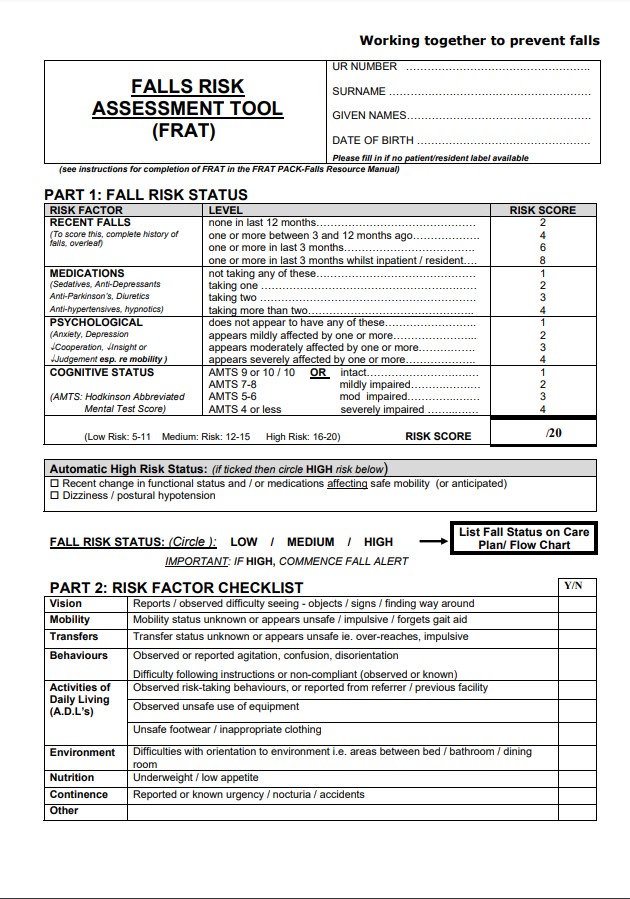Little Known Questions About Dementia Fall Risk.
Little Known Questions About Dementia Fall Risk.
Blog Article
Our Dementia Fall Risk PDFs
Table of ContentsDementia Fall Risk Fundamentals ExplainedThe Facts About Dementia Fall Risk RevealedNot known Facts About Dementia Fall RiskThe 6-Second Trick For Dementia Fall Risk8 Simple Techniques For Dementia Fall Risk
You could be nervous because you have actually had an autumn before or because you've observed you're starting to really feel unsteady on your feet. You may have noticed changes to your wellness, or just feel like you're reducing a little. Whatever the reason, it isn't unusual to become mindful and shed confidence, and this can stop you doing things you used to do and make you feel extra separated.If you've had an autumn or you have actually begun to really feel unsteady, tell your physician also if you really feel fine or else. Your medical professional can inspect your equilibrium and the means you walk to see if renovations can be made. They might have the ability to refer you for a drops danger analysis or to the drops avoidance solution.
This info can be gotten through meetings with the person, their caretakers, and a testimonial of their medical records. Begin by asking the individual regarding their history of falls, including the frequency and conditions of any kind of recent drops. Dementia Fall Risk. Ask about any kind of movement troubles they may experience, such as unsteady or problem walking
Conduct a complete testimonial of the person's drugs, paying certain interest to those understood to increase the risk of drops, such as sedatives or drugs that lower blood stress. Identify if they are taking several medicines or if there have actually been recent adjustments in their medicine routine. Evaluate the person's home setting for potential dangers that can increase the danger of drops, such as inadequate lights, loosened carpets, or absence of grab bars in the washroom.
Excitement About Dementia Fall Risk
Overview the individual with the fall risk evaluation kind, explaining each concern and taping their responses precisely. Determine the complete danger score based on the actions provided in the assessment kind.
This strategy may consist of exercise programs to improve stamina and equilibrium, drug changes, home alterations, and recommendations to various other experts as required. Regularly check the individual's progress and reassess their risk of falls as required. Customize the treatment strategy based on adjustments in their health and wellness status or home setting. Give recurring education and learning and assistance to advertise safety and security and decrease the threat of drops in their everyday living activities.
Lots of researches have shown that physical treatment can assist to decrease the threat of dropping in grownups ages 65 and older. In a new study (that took a look at drops threat in women ages 80 and older), scientists calculated the financial impact of selecting physical treatment to stop falls, and they found that doing so conserves $2,144, consisting of all the covert expenses of your time, discomfort, missed out on life events, and the dollars paid for solutions.
Examine This Report about Dementia Fall Risk
Examining your heart rate and high blood pressure dimensions at remainder and while you turn (from resting or lying to standing). A straightforward test of your thinking (cognitive) capabilities. Analyzing your balance, toughness, and strolling capability. A simple vision examination. Examining your feet and footwear. A home safety assessment. Based upon the assessment results, your physiotherapist will certainly design a plan that is customized to your specific demands.
Older adults that have difficulty strolling and talking at the very same time are at a greater risk of dropping. Dementia Fall Risk. To assist increase your safety throughout daily tasks, your physiotherapist might make a training program that will test you to maintain standing and strolling while you do an additional job. Examples include walking or standing while counting backwards, having a discussion, or lugging a bag of groceries
Set objectives visit here for enhancing their physical activity. Exercise much more to boost their stamina and balance. These great post to read programs often are led by volunteer instructors.
The Buzz on Dementia Fall Risk

Measles, or rubeola, is a very infectious, acute viral transmittable condition brought on by the measles infection. Some individuals believe of measles as just a breakout and fever that gets rid of up in a few days; however, measles can create major health and wellness issues, specifically in youngsters more youthful than 5-years-old. The most effective security versus measles is the measles, mumps, and rubella (MMR) vaccine.
Loss are a typical source of injury amongst older adults. According to the CDC, in one year alone, fall-related injuries added to over $50 billion in medical prices (Dementia Fall Risk). In healthcare facility settings, older adults are at particularly high risk of drops due to the fact that their minimized movement from being constrained to a space or bed.
The Greatest Guide To Dementia Fall Risk

She has a case history of seizure disorder and hypertension. She is receiving an IV infusion and taking Gabapentin and Lasix. She has no history of falls, her stride is constant, and she nullifies without issues. The previous nurse states that she calls for help to the shower room when she requires to go.
Instances of typical autumn interventions/measures consist of: Ensuring an individual's vital things are within reach. Putting the person's bed rails up with the alarm system on. Aiding a person while they're getting up from bed. Past comprehending exactly how to use the Johns Hopkins Autumn Threat Assessment Device, it is necessary that facilities include its usage right into a much more comprehensive autumn prevention strategy.
Report this page